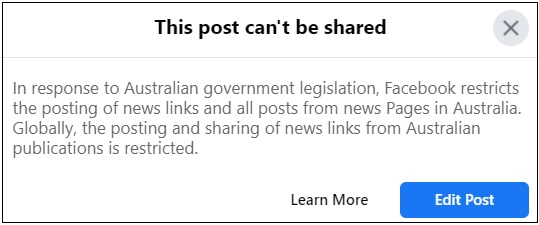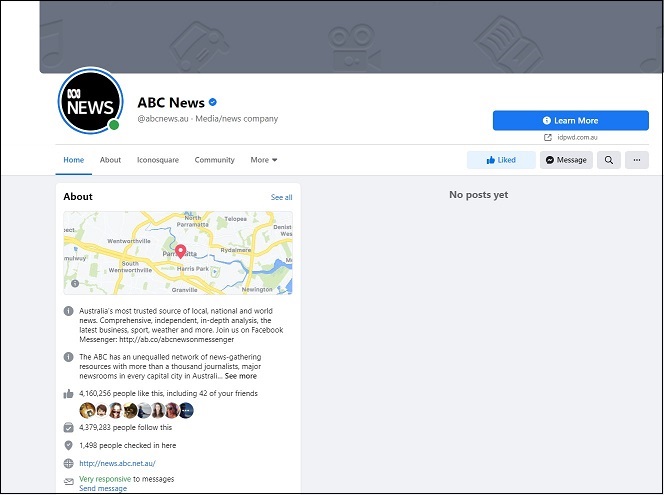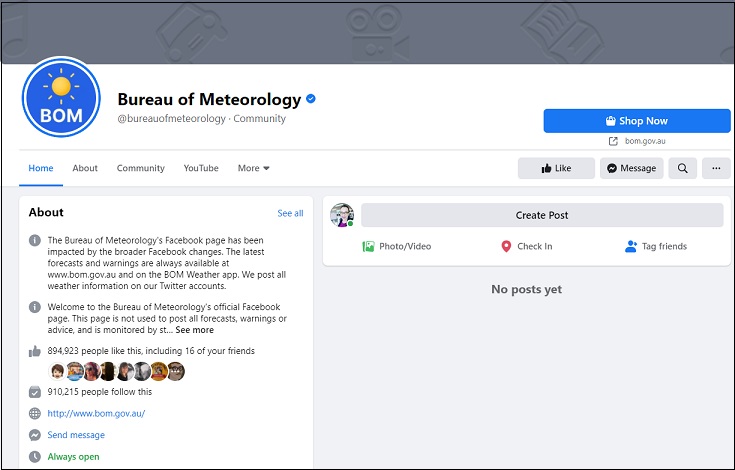Social media giant Facebook has halted the sharing of Australian and international news in face of the incoming Media Bargaining Code, and ruled out future investment in local publishers.
As of this morning, Australian users can no longer view or share content from any news publishers, including international publications, on Facebook.
The Facebook pages of the ABC, News Corp, and the Sydney Morning Herald have had their content wiped, and are now all showing as having ‘No posts yet’.
Publishers are now banned – or ‘restricted’, in Facebook parlance – from posting any news content on their Facebook pages.
Facebook warned it would take this action last September if the Media Bargaining Code became law.

What Facebook users saw this morning. Photo: Supplied
William Easton, Facebook Australian and New Zealand managing director justified the move, saying the proposed law “fundamentally misunderstands the relationship between our platform and publishers who use it to share news content.
“It has left us facing a stark choice: attempt to comply with a law that ignores the realities of this relationship or stop allowing news content on our services in Australia.
“It is with a heavy heart we are choosing the latter.
“This is not the outcome we wanted and it's a step we take reluctantly.”
The move comes as a slap to the Australian government, particularly treasurer Josh Frydenberg, who claims to have held “constructive” talks with Facebook CEO Mark Zuckerberg as recently as this morning.
“He raised a few remaining issues with the Government’s news media bargaining code and we agreed to continue our conversation to try to find a pathway forward,” Frydenberg said.
This morning, I had a constructive discussion with Mark Zuckerberg from #Facebook.
— Josh Frydenberg (@JoshFrydenberg) February 17, 2021
He raised a few remaining issues with the Government’s news media bargaining code and we agreed to continue our conversation to try to find a pathway forward.
However, communications minister Paul Fletcher said this morning the government would be proceeding with Media Bargaining Code – which seeks payment from the tech giants for displaying Australian news – saying Facebook should “think very carefully about what this means for its reputation and standing.”
And it’s not only Facebook’s 14 million Australian users feeling the pain.
International Facebook users can no longer view Australian news or share it.
“To do this, we are using a combination of technologies to restrict news content and we will have processes to review any content that was inadvertently removed,” Easton said.

Where did the news go? Source: Supplied
Future Facebook investment
Facebook says it was prepared to launch Facebook News in Australia and increase its investment with local publishers, but they were only prepared to do that “with the right rules in place”.
Instead, Easton said, “we will now prioritise investments to other countries as part of our plans to invest in new licensing news programs and experiences.”
Facebook has not defined ‘publisher’, resulting in the inadvertent wiping of data from pages such as the Bureau of Meteorology (BOM), Domestic Violence Awareness Australia, Triple J, and even Facebook's own page.

Let's talk about the weather. Photo: Supplied
News makes up less than 4 per cent of the content people see on Facebook, the company said, but generates “approximately 5.1 billion free referrals to Australian publishers worth an estimated $407 million.”
Taking a different path
Faced with the same Media Bargaining Code challenge, Google – which threatened to withdraw Search from Australia – has instead announced a raft of deals with publishers in the past few days, including Seven, Nine and News Corp.
But Easton said Google and Facebook were different beasts.
“Google is inextricably intertwined with news and publishers do not voluntarily provide their content,” Easton said.
“On the other hand, publishers willingly choose to post news on Facebook, as it allows them to sell more subscriptions, grow their audiences and increase advertising revenue.”
Despite the drastic action Facebook has taken, it appears to have left the door slightly ajar.
“We hope that in the future, the Australian government will recognise the value we already provide and work with us to strengthen, rather than limit, our partnerships with publishers.”










